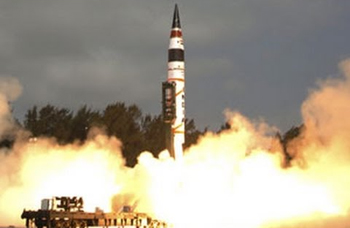Balasore, Oct 17: India on Friday test-fired the indigenously developed sub-sonic long-range cruise missile 'Nirbhay' from the Integrated Test Range at Chandipur.
 The missile took off at 10:04 am and after reaching a height of 800 metres, took a sharp turn towards the Bay of Bengal.
The missile took off at 10:04 am and after reaching a height of 800 metres, took a sharp turn towards the Bay of Bengal.
Sources at the Defence Research and Development Organisation (DRDO) said it will only be known after 11:00 am whether the test was successful.
Today's test was the second developmental trial of the nuclear-capable Nirbhay missile.
The missile was test-fired for the first time on March 12, 2013 from the same base. However, the flight had to be terminated mid-way, as deviations were observed from its intended course.
India has in its arsenal 290-kilomere range supersonic "BrahMos" cruise missile which is jointly developed by India and Russia. But 'Nirbhay' with long-range capability is a different kind of missile being developed by the Aeronautical development Establishment (ADE), a Defence Research and Development Organisation (DRDO) associated lab in Bangalore.
Nirbhay blasts off like a rocket but turns into an aircraft later. It is capable of flying at tree-top level which protects it from being detected by radars. Also, it has the capability to manoeuvre around its target to strike with precision.
The missile can carry conventional as well as nuclear warheads and hit targets between 700 to 100 kilometres away.
Nirbhay has a good loitering capability, good control and guidance, high degree of accuracy in terms of impact and very good stealth features.
Officials say the missile will add a new dimension to the Indian armed forces' capability.





Comments
Add new comment